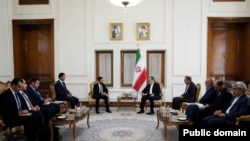During a meeting hosted by U.S. President Donald Trump at the White House on August 8, the leaders of Armenia, Azerbaijan, and the United States signed a joint declaration that, among other provisions, establishes a U.S. role in overseeing a transit route through Armenia, which Azerbaijan has demanded as a link to its Nakhichevan exclave.
In an interview with Iran’s state-run IRNA news agency during an official visit to Tehran, Armenia’s Deputy Foreign Minister Vahan Kostanian addressed the project, which has been dubbed the “Trump Route for International Peace and Prosperity” (TRIPP) in honor of the U.S. leader.
The project to be implemented in Armenia’s Syunik province, which borders Iran, has raised alarm in Iranian circles due to the perceived expansion of U.S. influence in the region.
“Regarding Tehran’s concerns about this agreement and the role of the United States, I must say this has been one of the main topics of our discussions yesterday and today,” said Kostanian, who met with senior Iranian officials, including Foreign Minister Seyed Abbas Araghchi, in Tehran on August 12-13.
“I have come here with the message that Armenia has taken Iran’s considerations into account,” he underscored.
According to Kostanian, a company will be registered in Armenia under the project, with shares divided between Armenia and the United States. “But this does not mean a U.S. security presence in the region. We understand that this has been one of the key concerns of the Iranian side, and I believe this concern has been addressed,” he said.
Kostanian reaffirmed Armenia’s commitment to maintaining the free and uninterrupted operation of its border with Iran.
“The uninterrupted and obstacle-free functioning of the Iran–Armenia border and its crossings for the movement of goods and passengers is of strategic importance, and we do not expect any obstacles in this regard,” he said.
He also noted that the opening of new communication routes will be carried out on the basis of the sovereignty and jurisdiction of countries — a principle he described as a “guarantee in itself” against external interference.
Earlier, Armenian Prime Minister Nikol Pashinian held a phone calls with Iranian President Masoud Pezeshkian to brief him on the outcomes of the Washington meetings, emphasizing that regional communication channels will operate under the principles of territorial integrity, sovereignty, and jurisdiction of countries, and on the basis of reciprocity. According to his press service, during the phone call the Armenian premier also highlighted opportunities for broader regional cooperation.
Further discussions between the leaders of Armenia and Iran are expected next week when Pezeshkian is due to visit the South Caucasus country.




